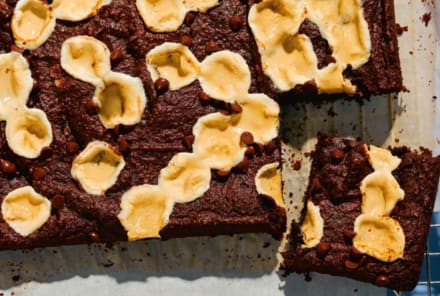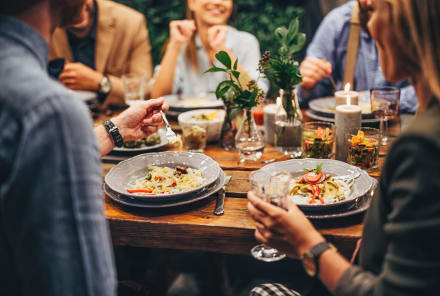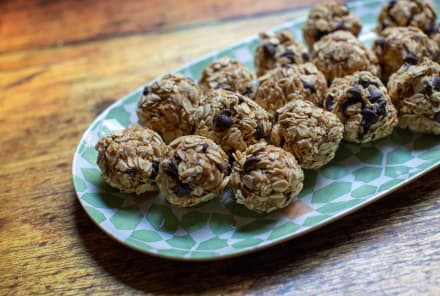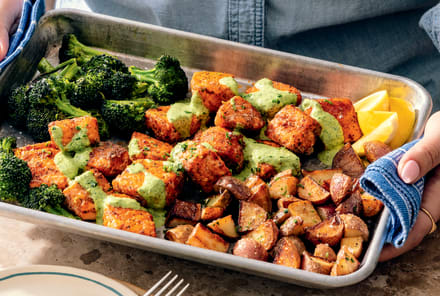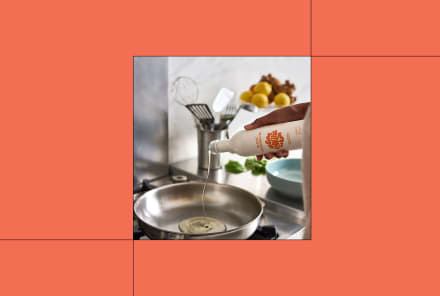Advertisement
I Used To Be Addicted To Cheese. Here's How I Gave Up Dairy And Transformed My Health
To say that I used to love cheese is an understatement. I was a high priestess of the church of cheese and payed fromage, er homage, to its holy altar. Nothing tasted complete without it.
I even took my love affair across the pond when I studied abroad in France during college. A solid month of cheese, bread, and cream-filled goodies. Let’s put it this way: I left the country after getting measured for a bridesmaid's dress. When I returned, the dress wouldn’t zip.
But it wasn't until about two years ago that I started to shift my dairy habits. I was 25 and looking to clean up my lifestyle, and the trainer I was working with suggested cutting out dairy as a great place to start. She explained that we're the only animals who drink another animal's milk (which I found interesting, since it means we deviate from what we see in nature). Plus, the milk we're drinking today is not the same as what our grandparents had on the farm.
All of that was enough to convince me to give it shot. Plus, I’m a great student and I also like people-pleasing. So honestly, I mostly tried it to prove that I could, and win favor with my trainer.
All that time I was consuming dairy, I was ignorant of how it was actually making me feel.
I started with what I felt were the easiest products to replace: I substituted regular cow's milk, which I didn't drink much of to begin with, with coconut or almond milk. Then I swapped butter for a vegan spread, and ice cream for nondairy alternatives. But cheese was the last to go. Because, I thought, what warm-blooded, decent person doesn't eat pizza — or worse, refuses it when offered at a social gathering?
It took a while for the social factor to fade. When you decide to make a lifestyle change like giving up dairy, you experience unsolicited feedback from friends, family, and co-workers. Some of my favorite responses were "I would DIE if I were you!" and the classic, "I feel like I don't even know who you are anymore!"
I did cave every once in a while and had a bite of brie or a piece of bread with real butter — but I didn't beat myself up about it. Instead, I used it as a lesson in why I'm making my food choices: am I eating consciously or am I being influenced by societal trends?
After a couple of weeks with no dairy, I decided to incorporate it back into my lifestyle. I hadn't noticed any dramatic changes in my body other than increased regularity and ease with bowel movements. I had given it a try and proved I could do it. But now it was time to get back together with pizza. Absence made the heart (and cheese craving) grow fonder.
But something happened after I embraced cheese again. Within a couple of hours of eating pizza, I felt physically ill. It felt like a brick fell into my stomach and was surely going to remain there for the rest of my life. Plus, my nose was stuffy. I couldn’t breathe that night when I went to sleep. And finally, I couldn’t poop! It totally messed with my regular schedule and made me feel icky.
It took a few more instances of eating dairy products and feeling the wrath of their hangovers to be done with that experience of feeling yucky and stopped up. I realized I was holding on to the mental attachment of the cheese — the melty, stretchy visual allure — rather than acknowledging how it was affecting me physically.
All that time I was consuming dairy, I was ignorant to how it was actually making me feel. It took detoxing to fully understand the results that were showing up in my body.
Ever since then, I've stayed dairy-free and I love how I feel, physically and mentally. I’m no longer a slave to cravings. I operate more from a place of needs rather than wants when it comes to food. Plus, giving up dairy lent itself to a bunch of other empowering changes in my life, like releasing other unhealthy lifestyle choices, losing weight, and sleeping more soundly.
Honestly, I don’t even feel deprived or miss any of it. But as someone who once cherished cheese, I know how hard it might seem at first to give up dairy. Here are four tips I used to make it easier:
1. Eliminate dairy gradually and try the "crowd out" approach.
Sure, you can drop dairy all at once if you'd like. But for more intense cheese addicts like myself, slow and steady was the name of the game. A gradual phaseout is a much more sustainable approach.
In my case, I started with what I was least attached to: milk and coffee creamers. It was an easy shift that empowered me to explore other alternatives for butter and creamy desserts, before addressing cheese.
I also recommend the “crowd-out” approach with my own health coaching clients. That means incorporating other healthy options into your routine, instead of depriving yourself of the things you enjoy. For example, add a big salad to eat along with your pizza, or a cup of fresh-squeezed fruit before you have your coffee with cream in the morning. In time, the new things you’re introducing reduce and eliminate the dairy.
2. Explore delicious dairy-free alternatives.
Did you know there are dairy-free cheeses, milks, ice creams, and every other thing you could possibly imagine? Not only do they exist, but they're popping up more and more in large grocery chains and at affordable prices. And they’re amazing — I’ve made dairy-free dishes for the most avid dairy eaters who have gobbled them up, and better yet, not even known the difference!
Some of my favorites: Daiya cheese for nachos, vegan mac and cheese and sandwiches, So Delicious coconut milk for cereal and in tea, Earth Balance vegan butter for cooking and spreads, and cashew ice cream as a great ice cream alternative.
3. Grab a buddy or accountability partner.
If going dairy-free is a big life change for you, support is essential.
So place yourself in environments where your choices are respected and encouraged. Enlist a friend to take the dairy-free journey with you, and share your wins with someone who can cheer you on.
4. Cook for yourself.
The best way to know the ingredients in the dishes you’re eating is to make them yourself! You’re the master of what you’re eating when you do the cooking.
Plus, there are a ton of great, free resources for vegan and dairy-free recipes. Some of my favorites: Minimalist Baker, Oh She Glows, and Cookie and Kate.
Watch Next
Enjoy some of our favorite clips from classes
Enjoy some of our favorite clips from classes
What Is Meditation?
Mindfulness/Spirituality | Light Watkins
Box Breathing
Mindfulness/Spirituality | Gwen Dittmar
What Breathwork Can Address
Mindfulness/Spirituality | Gwen Dittmar
The 8 Limbs of Yoga - What is Asana?
Yoga | Caley Alyssa
Two Standing Postures to Open Up Tight Hips
Yoga | Caley Alyssa
How Plants Can Optimize Athletic Performance
Nutrition | Rich Roll
What to Eat Before a Workout
Nutrition | Rich Roll
How Ayurveda Helps Us Navigate Modern Life
Nutrition | Sahara Rose
Messages About Love & Relationships
Love & Relationships | Esther Perel
Love Languages
Love & Relationships | Esther Perel

